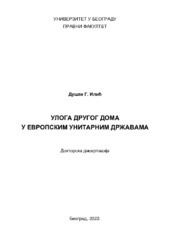Prikaz osnovnih podataka o disertaciji
Улога другог дома у европским унитарним државама
ǂThe ǂrole of the second chamber in European unitary states
| dc.contributor.advisor | Stanković, Marko | |
| dc.contributor.other | Petrov, Vladan | |
| dc.contributor.other | Orlović, Slobodan | |
| dc.creator | Ilić, Dušan | |
| dc.date.accessioned | 2023-05-08T14:12:34Z | |
| dc.date.available | 2023-05-08T14:12:34Z | |
| dc.date.issued | 2023-02-09 | |
| dc.identifier.uri | https://eteze.bg.ac.rs/application/showtheses?thesesId=9056 | |
| dc.identifier.uri | https://fedorabg.bg.ac.rs/fedora/get/o:29047/bdef:Content/download | |
| dc.identifier.uri | https://plus.cobiss.net/cobiss/sr/sr/bib/108205577 | |
| dc.identifier.uri | https://nardus.mpn.gov.rs/handle/123456789/21377 | |
| dc.description.abstract | Предмет истраживања у овом раду је данашња улога другог дома у државама европског континента које су неспорно унитарне. Циљ истраживања био је да се у тренутним уставноправним и друштвено-политичким околностима сагледа значај и позиција других домова на европском тлу. Имајући у виду потенцијалну примену бикамералног модела и у Републици Србији, ова студија се фокусирала искључиво на унитарне европске државе, остављајући по страни чак и оне земље за чије државно уређење у науци тренутно нема консензуса. Имајући у виду искуства постојања дводомног парламента, односно другог дома у Француској, Италији, Пољској, Чешкој Републици, Холандији, Словенији, Републици Ирској, Румунији и Белорусији, циљ овог рада је, пре свега, да укаже на перспективе бикамерализма у унитарним системима. Са друге стране, на основу анализираних модела, циљ овог истраживања је да покуша да допринесе евентуалном побољшању парламентаризма у Републици Србији, тако што ће понудити неколико могућих модела, који би, по узору на споменуте системе, могли унапредити положај Народне скупштине, али и генерално ојачати представничку функцију српског парламента. Ова студија пошла је од претпоставке да постојање другог дома оснажује умногоме пољуљану позицију легислативе у савременим демократским системима, те да је други дом један од малобројних уставних фактора који се озбиљније може супротставити све снажнијој егзекутиви. У том контексту, понуђен је и бикамерални модел који би, имајући у виду искуство других сличних европских система, комбинујући елементе демократског и социјално-економског бикамерализма, у Републици Србији могао да унапреди положај највишег представничког тела, те да буде стабилизирајући фактор у односима између законодавне и извршне власти. | sr |
| dc.description.abstract | The subject of research in this study is the current role of the second chamber in the countries of the European continent, which are indisputably unitary. The aim of the research was to see the significance and position of second chambers in Europe in the current constitutional and socio-political circumstances. Having in mind the potential application of the bicameral model in the Republic of Serbia, this study focused exclusively on unitary European countries, leaving aside even those countries for which there is currently no consensus in science. Therefore, having in mind the experience of the existence of a bicameral parliament, ie a second chambers in France, Italy, Poland, the Czech Republic, the Netherlands, Slovenia, the Republic of Ireland, Romania and Belarus, this paper primarily aimed to point out the perspectives of bicameralism in unitary systems. On the other hand, based on the analyzed models, this research tried to contribute to the possible improvement of parliamentarism in the Republic of Serbia, offering several possible models that could improve the position of the National Assembly, but also generally strengthen the representative function of the Serbian Parliament. This study started from the assumption that the existence of the second chamber strengthens the much shaky position of the legislation in modern democratic systems, and that the second chamber is one of the few constitutional factors that can seriously oppose the increasingly powerful executive. In that context, a bicameral model was offered, which, having in mind the experience of other similar European systems, combining elements of democratic and socio-economic bicameralism, could improve the position of the highest representative body in the Republic of Serbia and be a stabilizing factor in relations between legislative and executive. | en |
| dc.format | application/pdf | |
| dc.language | sr | |
| dc.publisher | Универзитет у Београду, Правни факултет | sr |
| dc.rights | openAccess | en |
| dc.rights.uri | https://creativecommons.org/licenses/by-nc-nd/4.0/ | |
| dc.source | Универзитет у Београду | sr |
| dc.subject | Други дом | sr |
| dc.subject | Second chamber | en |
| dc.subject | Unitary state | en |
| dc.subject | Europe | en |
| dc.subject | Bicameralism | en |
| dc.subject | Democratic bicameralism | en |
| dc.subject | Socio-economic bicameralism | en |
| dc.subject | Serbia | en |
| dc.subject | France | en |
| dc.subject | Poland | en |
| dc.subject | Italy | en |
| dc.subject | унитарна држава | sr |
| dc.subject | Европа | sr |
| dc.subject | дводомност | sr |
| dc.subject | демократски бикамерализам | sr |
| dc.subject | социјално-економски бикамерализам | sr |
| dc.subject | Србија | sr |
| dc.subject | Француска | sr |
| dc.subject | Пољска | sr |
| dc.subject | Италија | sr |
| dc.title | Улога другог дома у европским унитарним државама | sr |
| dc.title.alternative | ǂThe ǂrole of the second chamber in European unitary states | en |
| dc.type | doctoralThesis | |
| dc.rights.license | BY-NC-ND | |
| dc.identifier.fulltext | http://nardus.mpn.gov.rs/bitstream/id/150693/Disertacija_13479.pdf | |
| dc.identifier.fulltext | http://nardus.mpn.gov.rs/bitstream/id/152715/Referat.pdf | |
| dc.identifier.rcub | https://hdl.handle.net/21.15107/rcub_nardus_21377 |



